Around the Bloc: OSCE Monitors Come Under Fire in East Ukraine
The incident comes nine days after monitors were held at gunpoint by rebel forces, and follows a fresh attempt at a lasting ceasefire.
More...We kindly inform you that, as long as the subject affiliation of our 300.000+ articles is in progress, you might get unsufficient or no results on your third level or second level search. In this case, please broaden your search criteria.
The incident comes nine days after monitors were held at gunpoint by rebel forces, and follows a fresh attempt at a lasting ceasefire.
More...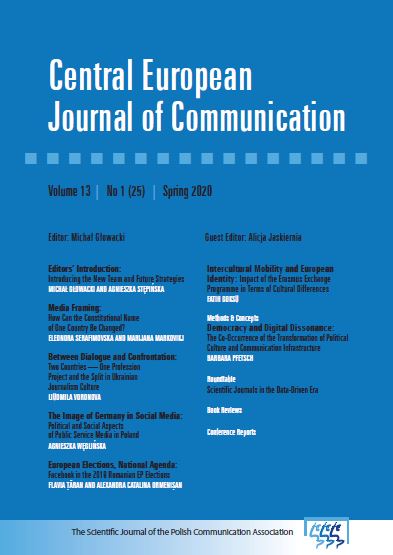
The Macedonian-Greek agreement to change the name of the Republic of Macedonia resulted in a referendum. The columns of relevant opinion leaders published in electronic media during the offi cial referendum campaign was the focus of interest and research presented in this article. The sample comprised 57 columns by 19 columnists. The discussion of the findings in this paper is based on framing theory with media content analyses; the template for media monitoring was used as an instrument based on human coding. The main research question addressed in this paper is: “How are opinion leaders setting frames?” The hypothesis is that opinion leaders use different themes and scripts to construct media framing due to narrow public opinion “for” or “against/boycott” the change of the constitutional name. Two negative, emotionally charged frames were identified: the frame “for” promoted positive messages reinforced with ideas about the EU and NATO membership; the frame “against/boycott” promoted messages that Macedonian identity will be lost.
More...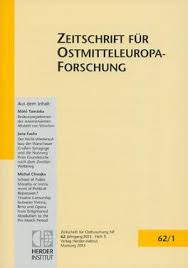
Review of: Quellen zur Verfassungsgeschichte der Universität Greifswald. Hrsg. von Dirk Alvermann und Karl-Heinz Spiess. Bd. 1: Von der Universitätsgründung bis zum Westfälischen Frieden 1456-1648. Bearb. von Benjamin M ü s e gades und Sabine-Maria W e i t z e l. (Beiträge zur Geschichte der Universität Greifswald, Bd. 10,1.) Steiner. Stuttgart 2011. LXI, 554 S. ISBN 978-3-515-09655-3. (€ 64,–.). Reviewed by Norbert Kersken.
More...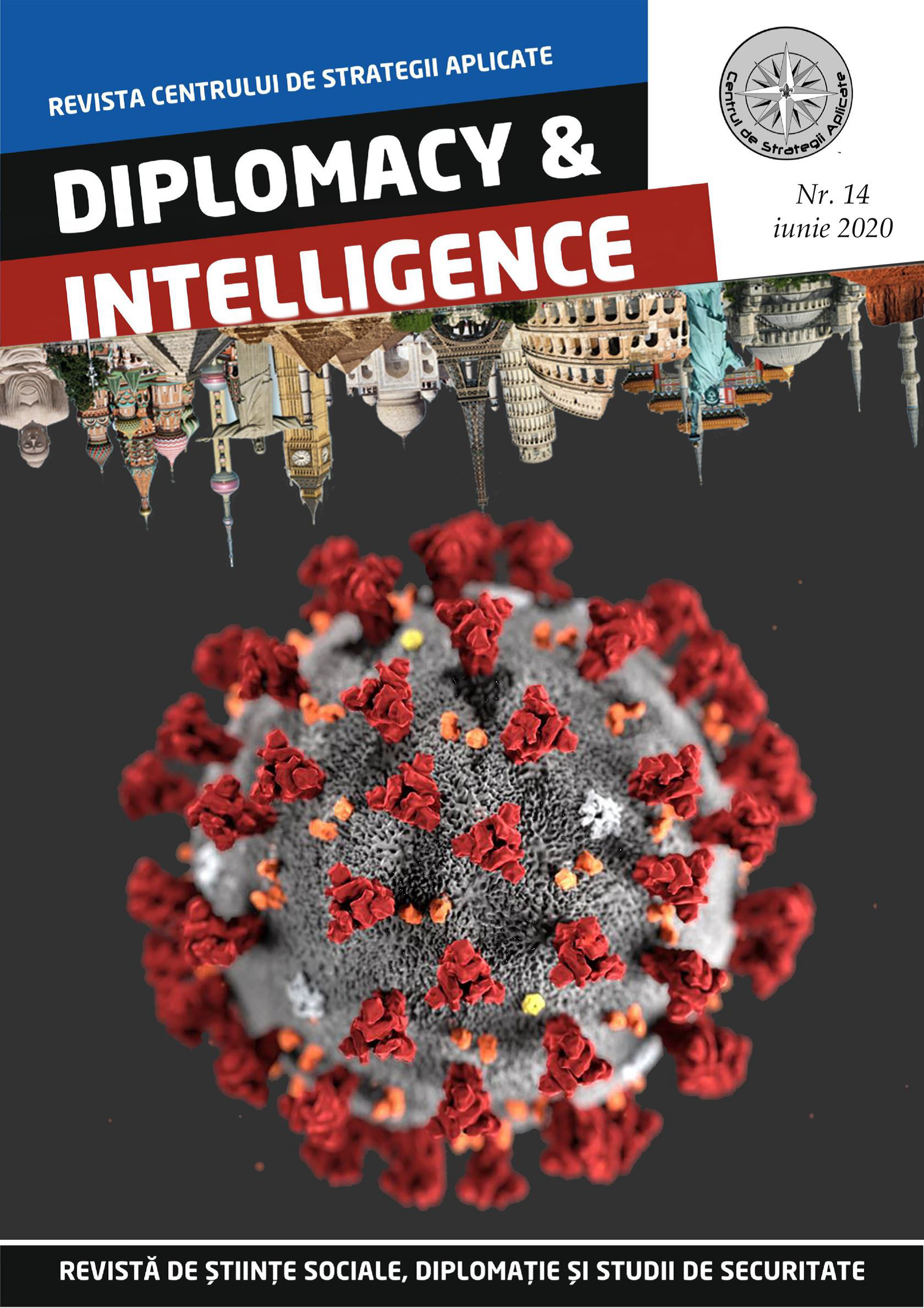
There is a pandemic with catastrophic effects worldwide, a population more or less and / or correctly informed, traffic restrictions are lifted due to the lifting of the state of emergency and an alert state is established, which in turn involves a number of restrictions. This whole framework, which can be explained by the nature of the events, seems to have a less explicable side, namely the inflammation produced in the public space by the adoption of these restrictions through Law no. 55/2020 on some measures to prevent and combat the effects of the COVID-19 pandemic and the normative acts issued in its application. Ah, and somewhere in the background, the Constitution is running, like a TV left open and to whom no one is paying attention any longer.
More...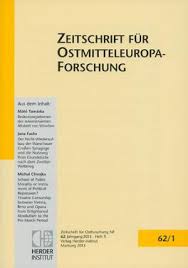
The American Revolution as reported in Polish journalism between 1788 and 1792 shows the coherence of 18th Century-Poland with the European Enlightenment and the May Constitution’s objective to display Poland’s independence. Furthermore, it provides a good example of the evolutionary understanding of the constitution as the result of interaction between the wording, the social context, political practice and scholarly interpretation. Unlike the American and the French Constitutions, the Polish Constitution of May 3rd, 1791, was not intended to legitimise a new type of post-Revolutionary governance. Rather, more in the tradition of the old pre-Revolutionary System, the preamble can be read as covenant between the nation and the King. The “nation”, however, was not the sovereign people, but the noble estates as representatives of the nation. Nevertheless, the 1791 Constitution shows impressively progressive aspects. It established the political as well as the legal accountability of ministers, uniting constitutionalism and parliamentarism. The legatees from the provincial councils, assembling in the legislative Chamber of Representatives, had a free mandate. Unlike the American Senate, the Polish Senate, as the second legislative chamber, consisting mainly of magnates, only had a suspensive veto. Both chambers decided by majority vote. Furthermore, the above-mentioned Polish Constitution is the only constitution of that period stipulating expressly its preeminence over ordinary law. Even in American constitutional law, the preeminence of the constitution was only developed as judge-made law, in order to legitimise the revolution as legal resistance against “unconstitutional” acts of the British Parliament. During the Great Sejm the conservative-reactionary Old-Republicans as well as the reformist Patriots used the Polish journals to promote their positions. The patriotic journals and other newspapers published several articles describing the allegedly classless American society as a model for Poland, emphasizing personal abilities as being more important than noble ancestry. Other essays highlighted the dependency between economic prosperity and political freedom in the United States. In the regular reports about the American political system and economic situation, the American president was a central feature. For the Patriots and the King, who considered a hereditary monarchy to be necessary to strengthen the Polish executive against the neighbouring despotic monarchies, the American President was only a surrogate for a monarchical executive. For the OldRepublicans, who favoured the elective monarchy of the old nobles’ republic, American Federalism would best be copied with the Polish system of a nobles’ republic and an elective monarchy. In the end, the reformers prevailed. During the festivities for the introduction of the new constitution, Washington and Franklin were celebrated as heroes. Thomas Jefferson praised the Polish Constitution as being equally as outstanding as the American. Even the brevity of the reformers’ success-story which ended with the partitions of Poland, does nothing to detract from the estimation that the reception of the American Constitution in Polish journalism is a typical example for communication of governance in the constitutional process.
More...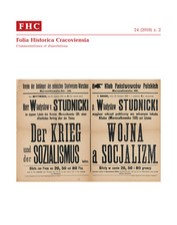
The article shows comprehensively a little-known subject of the first debate over the signing of the concordat between the Second Polish Republic and the Holy See that took place during the constitutional debate of the Legislative Sejm in years 1919–1921. In contrast to the parliamentary dispute in 1925 over the final ratification of the concordat, which was widely presented in the contemporary literature, the first debate in the Legislative Sejm was only a prelude and focused on establishing the sole principle of the concordat in the text of future constitution. According to it, this first debate determined only the legal way in which detailed relations between the Catholic Church and the state should be established in the future. The subject of the article was presented in chronological order, which corresponds with the sequence of constitutional efforts in the parliament. The article is based mainly on the historical sources in the form of stenographic records and documents of the Legislative Sejm (1919–1922). Its analysis makes it possible to recreate the first parliamentary debate over the principle of concordat in future constitution.
More...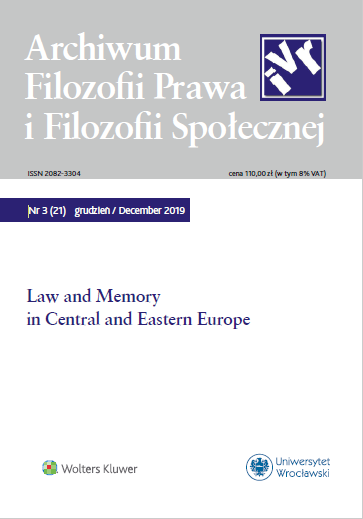
The paper deals with the link between the notions of constitutional identity and nostalgic collective memory. Starting from the notion of nostalgia of postmodern society as used in social theory, it shows that this cultural condition is reflected in in constitutions. The point of reference for contemporary political projects is no longer the future but the past. Longing for a lost homeland becomes a dominant social emotion. The author shows that this vision of the past is present in constitutions, especially in post-communist countries. It influences constitutional identity and, due to different temporal structures, is in conflict with the constitutional identity of the EU. The article ends with an analysis of the consequences of such a politics of nostalgia and the possible defence mechanisms against it.
More...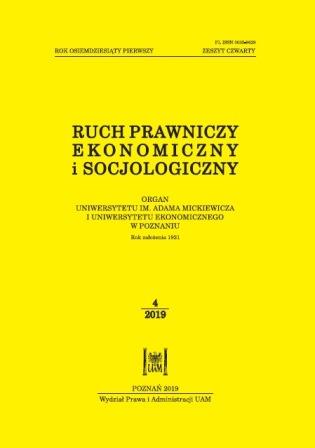
The inauguration of Nelson Mandela as South Africa’s first democratic president on 10 May 1994 became a symbol of the end of apartheid and the beginning of a new chapter in the country’s history. As South African society was deeply divided, the 1993 Interim Constitution expressed the need for reconciliation between the people of South Africa and the reconstruction of its society. The legacy of apartheid was to be addressed based on ‘a need for understanding but not for vengeance, a need for reparation but not for retaliation, a need for ubuntu but not for victimization’. Due to its introduction into the Constitution, ubuntu – a philosophy of unity, cooperation, compassion and respect for human dignity, which originated in small African communities – became a source of values for the whole legal system. The goal of the text is to present the ubuntu philosophy and to describe its role in the South African transitional justice process and in selected areas of South African law (criminal law, evictions and defamation). On the whole, South Africa presents a unique case in which both the political transformation and the legal system were strongly shaped by the said philosophical and ethical concepts, which bear close resemblance to the idea of restorative justice.
More...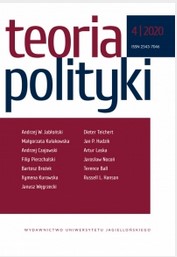
My aim here is to extend and further explore the deeper meaning of a phrase I coined some years ago: “deadly hermeneutics” (Ball, 1987):2 roughly, the idea that hermeneutics – the art of textual interpretation – can be, and often is, a deadly business, inasmuch as peoples’ lives, liberties and well-being hang in the balance. I plan to proceed as follows. By way of introduction and illustration I first consider very briefly three modern examples of deadly hermeneutics. I then go on to provide a brief account of the hermeneutical-political situation in which Abraham Lincoln found himself in the 1850s in the run-up to the Civil War and subsequently during the war itself. This requires that I sketch an overview of the Southern case for secession and, more particularly, their interpretation of the Declaration of Independence and the Constitution to legitimize that radical move. I then attempt to show how Lincoln invoked and used a counter-interpretation of the Declaration in his speeches on the Kansas-Nebraska Act (1854), the Dred Scott decision (1857), and his debates with Senator Stephen A. Douglas (1858). I next look at President Lincoln’s interpretation of the Constitution in the Emancipation Proclamation (1863), his suspension of Habeas Corpus and, finally, his finest, briefest – and at the time highly controversial – Gettysburg Address.
More...
In 1791 two former political allies reached opposite conclusions on the constitutionality of chartering a national bank to serve the Federal government of the United States. Alexander Hamilton, who was then Secretary of the Treasury, argued that the U.S. Constitution conferred limited, but essentially bottomless, powers to Congress in pursuit of the public good. James Madison, at that time an elected member of the U.S. House of Representatives, argued that powers conferred on Congress were limited in number, and reach, by conventions that ratified the Constitution in 1787–1788. Hamilton won the battle on the bank, but lost the war, as Madison’s strict construction of the Constitution in terms of the understanding of those who ratify, and amend, it prevailed in the long run. The broad construction favored by Hamilton has rarely carried the day in American jurisprudence.
More...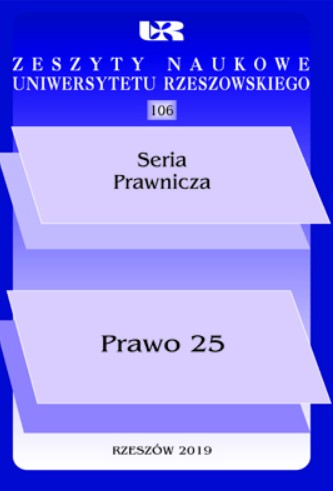
After November 1989, in Slovakia, as well as in other Central and Eastern European countries, significant political, economic and social changes took place. These changes related to almost every area of social life, not to the justice. It is true that socio-cultural changes as such were at first only of an optical nature, since their transformation into ordinary people's life was difficult in many ways, or even impossible, and ultimately still going on. In some areas, however, the processes associated with the change of the political system have come very slowly or almost at all. An example of this is the area of justice, ie the judiciary.
More...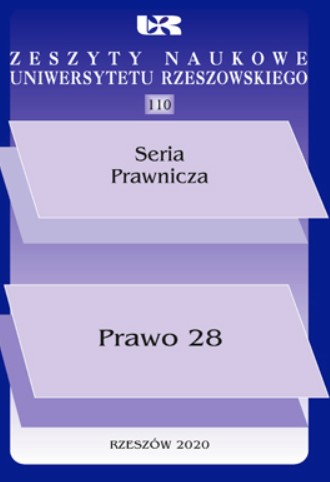
Independence by Poland in 1918 was associated with the need to adapt various legal systems in force within the borders of the reborn state. The Polish authorities faced the challenge of defining the state’s political framework and the scope of competences of its supreme organs. Among many authors dealing with constitutional law, Stanisław Starzyński, a lawyer – constitutionalist and politician, deserves attention. He wrote about the genesis and concept of law, functions of the state and the scope of state power. As an expert and analyst, he spoke about draft normative acts and legal acts that came into force. He had a critical attitude to the March Constitution, because by granting excessive powers to the Sejm, it led to an imbalance of power. For this reason, he formulated his own draft constitution, which was a correction to March Constitution. S. Starzyński was also skeptical about the April Constitution, the way it was implemented and provisions that did not guarantee the protection of individual rights and the control of state organs.
More...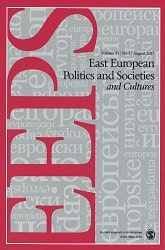
Kosovo is one of several Western Balkan countries that are part of the next round of accession to the EU. Like Bosnia, Serbia, and Croatia, it is also a country in which the history of conflict is recent and the benefits of EU membership ought to be a strong economic and political enticement to meet the standards necessary for membership. Yet, instead of major transformation of the post-conflict society towards democratization, economic development, and a robust human rights regime, the prospect of European Union membership appears to be leading to superficial legal changes without enforcement. This article investigates the tensions between internal challenges to legal change and external pressures for reform, adding to the literature on the decoupling of Europeanization and domestic change in candidate countries. A short analysis of one policy area, women’s property rights, illuminates the gaps between legal change and enforcement processes. The article also considers how and when a change in law can lead to social change. It is argued here that legal change in response to EU conditionalities may begin superficially, but creates an opportunity for collective action that can eventually lead to democratic change and a more robust enforcement of law.
More...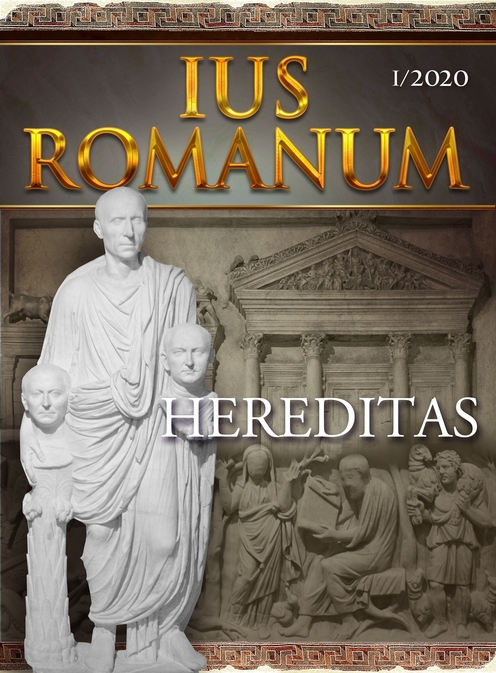
The article is devoted to the complex legal framework of collatio in Roman inheritance law. Its origin and its connection with the inheritance under praetorian law, as well as its development in classical and postclassical law are traced. The essence of the institute is related to the requirement for the emancipated children and daughters of the pater familias, who received a dowry before his death, if they participate in the inheritance to contribute these assets in order to make a fair distribution of the hereditary property between co-heirs. Special attention is paid to the constitution of Emperor Leo I of 472, preserved in CJ. 6.20.17. The continuity of the institute in the modern Italian Civil Code is also presented.
More...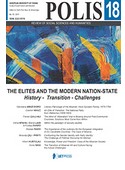
All Western Balkan countries currently holding the EU Candidate Country status, namely, Albania, Montenegro, FYROM, Serbia, and hopefully in the near future Kosovo, are in a critical stage of the EU integration. From their institutions are required serious reforms, and some of these reforms are necessary for almost all the of above countries. The focus of this paper is Albania. After the approval of the EU Candidate Country status, each branch of the Albanian government is now facing new legal challenges. However, at this stage, particularly after the vetting process, the central role passes to the judiciary, which should and could turn into a real “engine” of the EU integration. The new role of the Albanian judiciary for the EU integration should primary be understood and recognized by judges themselves, as well as academics and the public. Judges in particular, should know what instruments are available there, in order to best perform their new task. This paper initially aims to clarify the new role of the Albanian judiciary, as the “engine” of the EU integration, in order to raise awareness not just to judges, but also to academics and the public. Then, it will present what practical instruments can and must be used by the Albanian judiciary in order to best achieve the required EU integration. Examples of such instruments are: the preliminary ruling; principle of supremacy; principle of direct effect; principle of indirect effect; and most importantly, EU remedies in national courts.
More...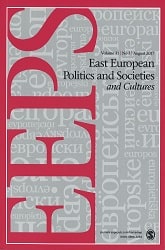
The social science literature on ethnically divided states is huge and varied, but suggestions for constitutional solutions are strangely uniform: “loose federations” of ethnically defined ministates, with minimal central authority that must act by consensus and thus cannot act at all on issues that are contested rather than consented. In Bosnia, the political system mandated by the international High Representative suffer the same structural flaws that were used to make the former Yugoslav federation and the Socialist Republic of Bosnia and Herzegovina unworkable. Similarly nonviable systems were proposed in 1994 to 1995 for Croatia and in 1998 to 1999 for Kosovo and recently for Cyprus and for Iraq. This article analyzes the paradox of mandating consensus-based politics in ethnically divided states, inclusion in which does not have the consent of most members of at least one group.
More...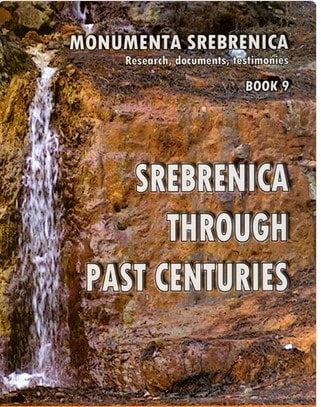
Zakonom o premjeru i katastru u entitetu Republika Srpska uvedenje sistem evidentiranja nekretnina i prava na njima kroz tzv. Jedinstvenu evidenciju nekretnina. Historijski gledano, sistem jedinstvene evidencije nekretnina nije novina u našem pravnom podneblju. Zakon o premjeru i katastru Republike Srpske iz 2011. godine predstavlja kontinuitet u namjeri entitetskog zakonodavca da nastavi sa pravnim naslijeđem bivše SFRJ i zakonska rješenja iz oblasti zemljišno-knjižnog prava u entitetu Republika Srpska približi sa zakonskim rješenjima Republike Srbije kao pravnom sljedniku SFRJ. Rješenje, predviđeno zakonom, da teret uspostavljanja katastra nekretnina i vođenja evidencije o pravima na njima ustupi organu uprave ostavlja mogućnost i za zloupotrebu, posebno u pogledu imovinskih prava povratnika, izbjeglih i raseljenih lica koji iz objektivnih razloga nisu u mogućnosti da aktivno učestvuju u postupku uspostave jedinstvene evidencije nekretnina. Ograničavajući pravo na sudsko odlučivanje o pravima na nekretninama u postupku uspostavljanja jedinstvenog katastra nekretnina suprotno je međunarodnim normama o pravu na imovinu kao nepovredivom ljudskom pravu. Zakon o premjeru i katastru Republike Srpske zapravo predstavlja nastavak realizacije ciljeva Deklaracije o proglašenju Republike srpskog naroda Bosne i Hercegovine i da pravno zaokruži proces etničkog čišćenja nesrba i genocida nad Bošnjacima.
More...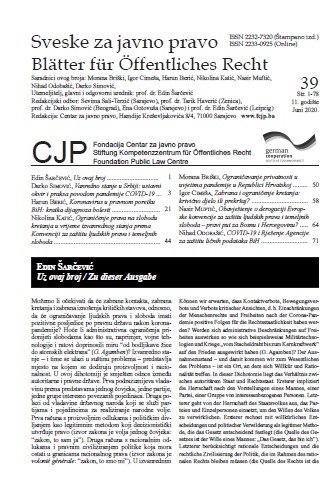
The Convention for the Protection of Human Rights and Fundamental Freedoms (hereinafter: the Convention) and the European Court of Human Rights in Strasbourg (hereinafter: the European Court), which interprets that Convention, classify the right to freedom of movement as derogable or qualified Convention rights. This means that this right can be restricted under the conditions recognized by the Convention and the case law of the European Court of Justice, and the protection of the health of a large number of people, public morals, national security and the like are justified for interfering or limiting the right to freedom of movement. The Convention and the European Court do not a priori prohibit the introduction of such measures, quite the opposite. The positive obligations imposed by the Convention in order to achieve the legitimate aim of protecting human health require from Member States active care and timely response. When considering measures that restrict human rights, it is crucial to make them legitimate, necessary in a democratic society and proportionate. The above rules, which follow from the case-law of the European Court of Justice, always apply, whether measures to restrict human rights are imposed in times of emergency or some other, less extraordinary time. When measures that result with restrictions of the right to freedom of movement (in whatever form) are criticised, it is important to keep in mind that on the other side of the scale is the right to life. Unlike freedom of movement and even deprivation of liberty, the right to life is an absolute Convention right and can never be derogated, even in times of emergency.
More...
The effective response to the COVID-19 pandemic requires the increased interference of authorities in the privacy of individuals. The Constitution of the Republic of Croatia, as well as the European Convention on Human Rights and the Charter of Fundamental Rights of the European Union proclaim that the right to privacy is not absolute and set the conditions for limitations of this right – the limitations must be based on law and proportionate to the legitimate aim of protection of public health. Croatia has undertaken several measures that limit the privacy during pandemic. The first set of measures is related to health data and its increased processing for the purposes of treatment of disease and the prevention of its spreading. The measures are based on the Law on protection of citizens against contagious diseases which provides procedures and rules for processing of personal health data during an epidemic and they appear to be proportionate to the aim they want to achieve. The analysis of GDPR in respect of health data demonstrates that this document takes into account emergency situations such as the pandemic at hand, and that its rules and principles of processing of personal dana remain applicable. Second set of measures relates to the tracking of location data of mobile devices and causes more concern from the point of view of the necessity in democratic society. The legislative changes proposed by the Croatian Government in respect of exceptional processing of location data in an emergency seem to lack some important safeguards, that were explicitly invoked recently by relevant institutions and bodies of the European Union and Council of Europe.
More...
Since the introduction of the prohibition and restriction of movement in Republic of Srpska, institutions having jurisdiction over criminal prosecution are faced with the question whether the violation of this prohibition constitutes the criminal offence of Non-compliance with Health Regulations during an Epidemic under Article 195 of the Criminal Code of Republic of Srpska or does it constitute the minor offence under Article 22 of the Law on Public Peace and Order of Republic of Srpska. After the introduction, this paper gives an overview of the elements of the criminal offence under Article 195 of the Criminal Code of Republic of Srpska. Further, the paper analyses whether the decision on prohibition and restriction of movement which is currently in force in Republic of Srpska represents a health measure - a measure for combating and prevention of spreading an epidemic of contagious diseases and it analyses the legal framework in Republic of Srpska in terms of measures for combating and preventing spreading of contagious diseases. The paper also provides an analyses of provisions of Article 43(2)(1) of the Law on Protection of Citizens of Contagious Diseases which prescribes restriction of movement as an extraordinary measure for combating and prevention of contagious diseases. Finally, the paper summarizes the presented arguments that violation of prohibition and restriction of movement may constitute the criminal offence under Article 195 of the Criminal Code of Republic of Srpska.
More...